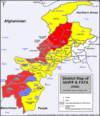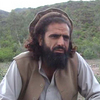|
Red agencies/ districts controlled by the Taliban; purple is de facto control; yellow is under threat. |
Just 10 days after the Pakistani government launched an offensive against extremist groups threatening Peshawar, the government signed a peace accord with the Lashkar-e-Islam, one of the purported targets of the operation. The peace agreement comes the same day that five members of the Frontier Corps were killed and three were wounded in an attack in Khyber.
The agreement, according to Geo TV states Lashkar-e-Islam would recognize the writ of the Pakistani government. “All religious groups would remain peaceful and the display of weapons in the region’s main town of Bara would be banned,” Geo TV reported. “A 13-member peace committee of tribal elders and Khyber administration officials has been formed to ensure the implementation of the pact which was signed in Peshawar.” The peace jirga “mostly comprises activists and sympathizers of Lashkar-i-Islam,” Dawn reported on July 7.
Prior to the peace talks, the government demanded that Lashkar-e-Islam surrender its weapons and recognize the government’s rule in the tribal areas. The Lashkar-e-Islam has not agreed to surrender its weapons.
The government initiated peace talks over the weekend with Mangal Bagh, the leader of the Lashkar-e-Islam, and the military put the operation on hold and lifted a curfew in the town of Bara. Bagh refused to put up cash or other forms of collateral to ensure he would end attacks. He also refused to hand over 60 members of the Lashkar-e-Islam. The government agreed to release all of those detained during the operation. Ninety-three people were detained, according to Dawn but only 11 were members of Lashkar-e-Islam.
The operation in Khyber began after a chorus of government, military, and civilian officials warned of the growing Taliban pressure on the provincial capital of Peshawar. The government claimed it launched its offensive to target the Taliban-linked extremists groups of Ansar-ul-Islam, Lashkar-e-Islam, and a faction led by Haji Namdar. The three extremist groups were banned by the Pakistani government. Bagh ordered his forces not to resist at the onset of operation, but threatened to attack if operations against his supporters continued.
But Namdar, the leader of the Promotion of Virtue and Prevention of Vice who allied with Mangal Bagh’s Lashkar-e-Islam, was seen riding along with the Frontier Corps, Pakistan’s paramilitary group assigned to conduct operations in Khyber. “He was taken along to ensure that encounters with militants were kept to a minimum,” the Asia Times reported. Government officials stated at the onset of the operation that the offensive would be limited in scope and was a “show of force.”
The agreement with the Lashkar-e-Islam in Khyber is the latest in a series of peace talks and deals with the Taliban and allied extremist groups operating in the tribal agencies and the Northwest Frontier Province.
This year, the government signed peace deals in North Waziristan, Swat, Dir, Bajaur, Malakand, and Mohmand. Negotiations are under way in South Waziristan, Kohat, and Mardan. The Taliban have violated the terms of these agreements in every region where accords have been inked.
Baitullah Mehsud, the leader of the Pakistani Taliban, ordered peace negotiations and agreements to be suspended after the Khyber operation. But Baitullah reversed his decision late last week, just as his spokesman began negotiations with Haji Namdar.










13 Comments
You forgot to mention that these peace deals are for Sharia law – something that they were possibly fighting for all along.
Peace deal means that pakistani government accepted the authority of talibans in the area. It can be interpreted that the authorities have accepted their demands and the criminal lashkar-e-islam got legality. They have huge base in Dabori Tirah and there is no writ of Pakistani government. They do what ever they want and their main crop is opium. Now this area is new safe heaven for all wanted militants. Tirah is very beautiful green valley and an illiterate ignorant and very dirty Mangal bagh is fooling 99% uneducated population. The inefficent incapable and very weak pakistani government is giving cradit to its corrupt authorities in the area for this shame deal.
Occasionally, make peace with our enemies, it keep them off balance.
The Thunder Run has linked to this post in the blog post From the Front: 07/10/2008 News and Personal dispatches from the front and the home front.
“They do what ever they want and their main crop is opium.”
That is part of the larger picture that I don’t believe enough people pay attention to. Pakistan is basically the world’s heroin dealer and the opium comes from areas controlled by these tribes. The amount of money pouring into Pakistan as a result of this trafficking has been estimated to be more than the entire “legitimate” economy of Pakistan. You can pay off a lot of people with that kind of cash … tax free.
Shutting down the heroin trade would put a severe hurting directly on a lot of powerful people there and indirectly to the rest of the economy of Pakistan as a good deal of that money does get spent there.
I believe these deals are more about protecting the heroin trade than anything to do with promises not to engage in terrorism. But if they were to promise to stick to heroin and give up the killing, the Pakistani government would probably be happy, in my personal opinion.
At least the Pakistanis are learning to conduct negotiations a little better now.
After all, you cant deal with an enemy that you are engaged in military conflict with solely by diplomatic means.
Of course, as Bill points out, all the tribal groups immediately violate their treaties with the Pakistani government as a general rule.
“the source of the opium crop is largely Afghanistan. Why has NATO/US failed to stop Opium cultivation in areas under their control?”
They generally have in many areas. Historically a lot of opium was grown in the Territories in Pakistan. A lot of these tribal areas span the border into Afghanistan. Much of this production was moved to Afghanistan when the Taliban gained power there. A deal was struck to end poppy cultivation in the Territories in exchange for payments to the farmers for their reduction in income. The processing of the opium to heroin remained in Pakistan. So what you had was poppies grown in Afghanistan being taken to Pakistan for processing and distribution. That mechanism remains today in areas populated by tribes that span the border.
The government has managed to eliminate a lot of poppy production in areas no longer controlled by the Taliban and populated by tribes with no connection with Pakistan.
Two years of bumper crops means there is currently a lot of opium, a couple of years worth, in storage in Pakistan, according to latest estimates. As that supply is used up, expect the Taliban to get more aggressive in maintaining their control of what poppy cultivation they have. These tribes have been making their money growing poppies for a very long time. It represents huge amounts of money. It isn’t going to go away without a fight.
“The sooner this raw material seizes to exist, the sooner will the processing of them will become irrelevant.”
I believe that is a very simplistic and naive way of looking at it. There is a reason the President of Afghanistan is interested in negotiating with these tribes and is against eradication methods such as spraying from the air. Again, we are talking about sums of money that are larger than the entire “legitimate” economy of Pakistan. We are talking about enough money to access any weapons technology on the planet. To think if this as simply a hunt for Osama bin Laden is to place some serious blinders on yourself.
There are a lot of powerful people in this world who are going to protect that cash flow. They will turn over bin Laden to protect it. In my opinion, all we need to say is “We will eradicate every single poppy field in a thousand mile radius if you don’t turn over bin Laden and Zawahiri” and we would have them in a week.
This is the kind of thing I am thinking about.
I am fairly confident that the drug traffickers would turn over bin Laden and Zawahiri if they thought over 100 BILLION dollars were at stake.
“Remember, opium growth in Pakistan is negligible”
It is right now, but that is new. Practically ALL the opium used to be grown in Pakistan. What the tribes did was move the cultivation to their territories on the Afghanistan side of the border and then started collecting money from the US and Pakistan for the farmers who stopped cultivating on the Pakistan side. So the tribes are growing just as much poppy, just in different fields. And the processing into heroin is still done in Pakistan.
And the money that is dispersed out to various dealers and middlemen is larger in the aggregate but it is not concentrated like the cash that comes into Pakistan. We are talking about a hundred BILLION or more in the hands of just a few people. Not hundreds more billion in the hands of thousands of different people widely scattered over the planet.
I can’t understand what the point of arguing it is, really, because everyone knows how much heroin is coming out of there and about how much cash is involved. The truth is that Pakistan is the world’s heroin dealer and they are going to protect that just like the cocaine cartels in South America. It is just a different narco-terrorism.
We didn’t eradicate the poppies becuse we are afraid it would turn the people against us and deeper into the arms of the Taliban. I say if there are no poppy fields in that region, then the Taliban dissolve anyway. It is a chicken/egg problem.
There’s a definite narco element to this as far a funding goes. I don’t agree with the position that the narcotics trade is the underlying cause of the current situation, although it does fund a large proportion of extremist activity. I might point out that extremist activity pervades much of the Muslim world and that Narcotics isn’t a major factor in much of that instability. Other funding mechanisms can be found such as the illicit diamond trade West Africa which played a major roll in funding the Algerian conflict a decade ago.
I tend to believe that the fight is ideological. These Islamist groups make that pretty clear. Tapping into illicit sources of income is tool, not a motivation. I’m not really sure you chicken and egg analogy fits this, although the thought of Ayman al-Zawahiri in a large chicken suit sitting on an equally large egg does come to mind. That’s probably my problem, not yours. Too bad I don’t have more time on my hands to work on those PhotoShop skills. Those picture editing skills seem to be popular these days, don’t they though? Hmmm Do I add a beak or do I just use the one that is already there.
Sorry, got off on bit of a tangent there. Back to the discussion at hand
Perhaps the above comment reads a little better with the following correction.
“I tend to believe that the fight is ideological. These Islamist groups make that pretty clear. Tapping into illicit sources of income is a means of support, not a primary motivation for these insergent groups. I’m not really sure your chicken and egg analogy fits this.”
Let us not repeat the mistake of Vietnam where we allowed the enemy access to the Ho-Chi-Minh Trail area next to the Mekong River in Laos so he could have a “safe haven.” The Jihadist areas of North-West Pakistan need to be engaged on the ground and by B52’s and B-1 bombers.
Cut the snake off at his head.